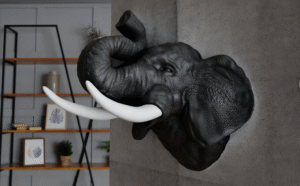
 In just a fortnight, Indian homes will glow with the spirit of Deepavali, as families prepare to welcome the Festival of Lights with joy and devotion.
In just a fortnight, Indian homes will glow with the spirit of Deepavali, as families prepare to welcome the Festival of Lights with joy and devotion.
Streets will glow with the shimmer of oil lamps, homes will be decorated, and the fragrance of sweets and curries will waft through kitchens.
But before the lamps are lit on Oct 20th, another vital ritual takes place, the age-old practice of cleansing one’s home and discarding the old to welcome the new.
Deepavali is not just about external brightness; it is about clearing away darkness in every form, physical, emotional, and spiritual.
This begins at home, quite literally, with an energetic sweep of the living space.
Families scrub, repaint, and reorganise their homes, giving a sense of freshness and vitality.
Alongside, cupboards are opened, shelves dusted, and the question arises: what should we do with the old and used items we no longer need, especially clothing and personal belongings like wallets and purses?
Discarding worn-out items is not merely an act of cleaning; it is symbolic of letting go of stagnant energy.
Vasthu Sastra emphasises that old, torn, or unused belongings trap vibrations of the past.
They act as energetic blocks, preventing new prosperity and good fortune from flowing in.
Deepavali thus becomes a perfect opportunity to release these items and make space for renewal.
Old clothes, in particular, are often accumulated in cupboards year after year.
Some are faded, others no longer fit, and a few may be sentimentally retained. But when clothes lose their freshness, they also lose their ability to energise the wearer positively.
Wearing dull or torn clothes is said to diminish confidence and attract negativity.
Hence, clearing them out is not only hygienic but also spiritually uplifting.
This leads us to a central question: Is it better to donate old clothes to the poor, or should they be disposed of altogether?
From a righteousness living perspective, donating is always encouraged when the items are in good, wearable condition.
Offering clothes to those in need, particularly before a major festival, brings joy and dignity to the recipients.
Imagine the smile on a child’s face when they wear a clean shirt or dress, or the warmth felt by someone receiving a sari for Deepavali; such acts carry tremendous positive energy.
In the language of karma, this becomes a merit, a good deed that blesses both the giver and the receiver.
However, one must also exercise discernment. Torn, badly stained, or unusable clothes should not be passed on in the name of charity.
Giving away unfit items is not an act of generosity, but rather a burden on another.
Such clothes are best recycled, repurposed as cleaning rags, or disposed of in a respectful manner.
Many traditions hold that the highest form of clothing donation during auspicious festivals like Deepavali is not old but new attire.
Buying new clothes and giving them to the less fortunate uplifts the spirit of the joyous event.
After all, Deepavali is about renewal, and what better way to help someone feel included in the celebration than to give them something new?
This principle is echoed in scriptures and customs: when you give, give your best.
Such giving creates lasting impressions of joy, and the karmic benefit is believed to multiply many times over.
If one can afford it, donating new clothes alongside used but good-quality items creates a beautiful balance of compassion and dignity.
Now, what about old wallets and purses?
These items are more than just carriers of cash and cards. Used wallets are believed to hold the energy of wealth.
A worn-out or torn wallet is thought to represent stagnation or loss of financial flow.
Holding on to them could symbolically mean holding on to financial obstacles.
The best way to deal with an old wallet is to retire it respectfully.
First, ensure it is empty. Any coins or small notes should be given to charity before being discarded into the sea, as money should never be thrown away.
When acquiring a new wallet, it is considered auspicious to place a small coin, a grain of rice, or a symbol of prosperity, such as a Lakshmi Goddess or the Kuber wealth yantra, inside before using it. This act invites fresh financial energy.
In Vasthu Shastra, imagery carries energy, and every picture or sculpture in a home influences the vibrations of the space.
A bodiless image of an animal, deity, or human figure is considered inauspicious because it represents incompleteness, disconnection, and imbalance.
Such images are not seen as decorative but rather as carriers of fragmented energy.
As the countdown to the Festival of Lights starts, approach it mindfully and avoid decorating your homes with things that do not benefit the family.
Award-winning writer Dr T. Selva is the author of the bestsellers Vasthu Sastra Guide and Secrets of Happy Living. To get a copy, WhatsApp 019-2728464. He can be reached at drtselvas@gmail.com. Facebook: Vasthu Sastra


